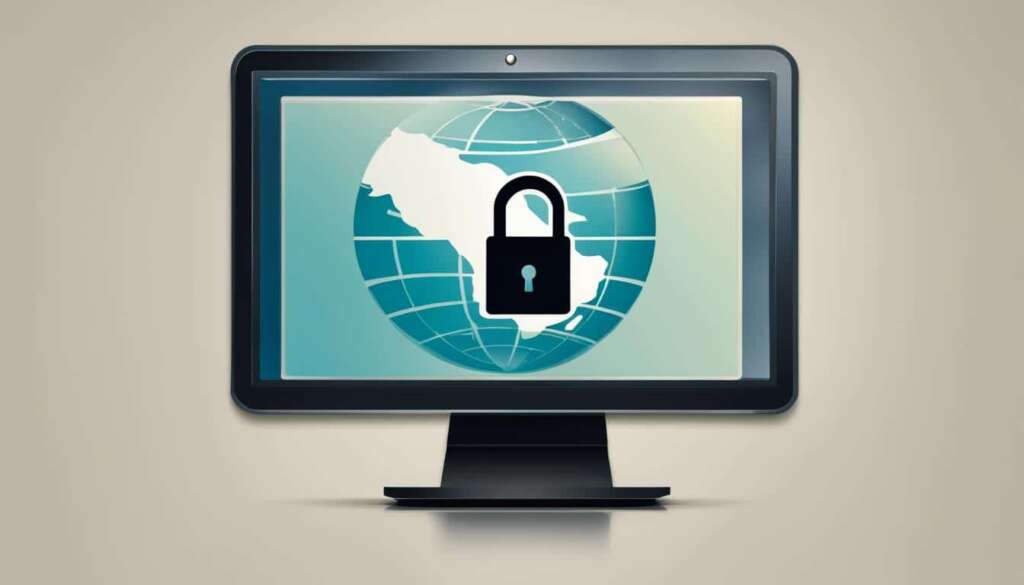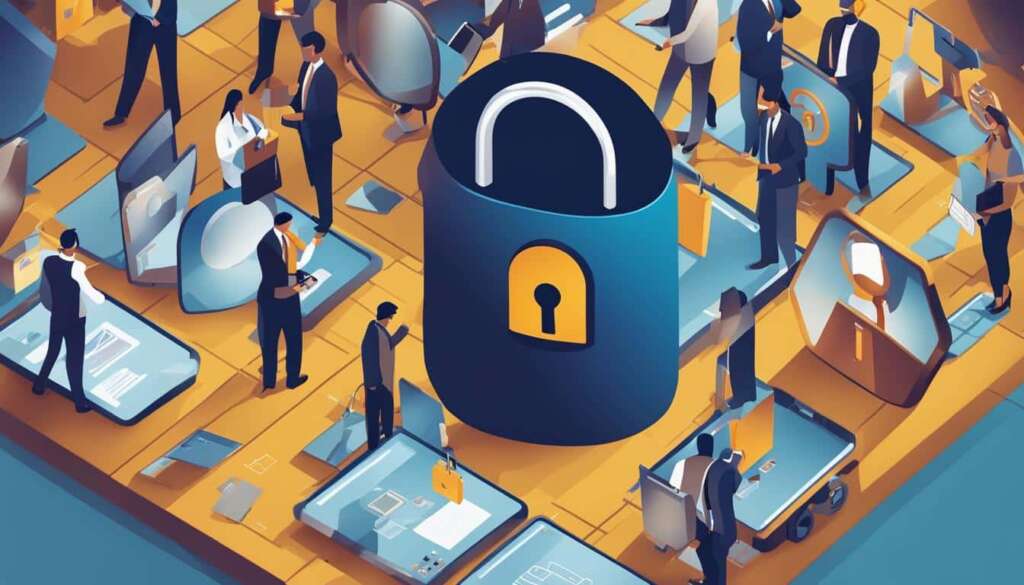Table of Contents
Online data safety is a critical concern in today’s digital landscape. With the increasing frequency and sophistication of data breaches, it is essential for individuals and businesses to take proactive measures to protect their sensitive information. In this article, we will explore effective strategies to prevent data breach incidents and develop a comprehensive data breach prevention plan.
Data breaches can have devastating consequences, both financially and reputationally. The average cost of a data breach is a staggering $3.86 million, and it takes an average of 280 days to identify and contain a breach. The rise of remote work has further complicated the landscape, leading to an estimated additional cost of $137,000 per breach.
Breaches can occur through various means, including physical actions such as stealing paperwork or accessing physical assets, as well as through phishing scams and accidental actions. To prevent data breaches, it is crucial to educate employees about the risks and best practices, establish data security procedures, and implement roles and permissions to restrict access to sensitive information.
Remote monitoring and regular data backups are also essential components of a robust data breach prevention plan. Additionally, proper data disposal and physical data security measures should be taken to ensure the safe handling and storage of sensitive information. Implementing security software, firewalls, and encryption tools can provide an added layer of defense against breaches.
By following these strategies and staying vigilant, individuals and businesses can significantly reduce the risk of data breaches and protect their online data safety.
Understanding the Types and Costs of Data Breaches
Data breaches are a significant threat to businesses of all sizes, especially small-to-medium-sized enterprises (SMEs). Understanding the different types of data breaches and the associated costs is crucial for SME owners to prioritize their cybersecurity efforts and protect their valuable information.
Types of Data Breaches
There are various ways in which cybercriminals can gain unauthorized access to sensitive data. Some common types of data breaches include:
- Malicious attacks: These involve deliberate actions by hackers to infiltrate a company’s systems and steal confidential information.
- Physical breaches: These occur when physical assets or paperwork containing sensitive information are stolen or accessed without authorization.
- Accidental breaches: These result from unintentional actions, such as employees mistakenly sharing sensitive data or falling victim to phishing scams.
It’s important to note that not all breaches are caused by malicious attacks. In fact, approximately half of all breaches are accidental or the result of physical breaches. Understanding these different types of breaches is essential for implementing effective prevention strategies.
The Cost of Data Breaches
The financial impact of a data breach can be devastating for businesses. On average, a single data breach costs an organization $3.86 million, including the expenses associated with incident response, investigation, legal fees, customer notifications, and potential regulatory fines. This does not even account for the long-term damage to a company’s reputation and customer trust.
For small-to-medium-sized business owners, the cost of a data breach can be particularly burdensome. SMEs often have limited resources and may struggle to recover from the financial and reputational impact of a breach. Therefore, it is crucial for SMEs to prioritize data security measures to minimize the risk of a breach and protect their businesses.
By understanding the types of breaches and the associated costs, small business owners can make informed decisions about their cybersecurity strategy. Implementing appropriate security measures and educating employees about data protection can help mitigate the risk of a breach and ensure the safety of valuable business information.
High-level Security Measures to Prevent Data Breaches
Implementing high-level security measures is crucial to prevent data breaches and safeguard sensitive information. These measures are especially effective for large businesses, but small business owners can also take steps to protect their data.
Artificial Intelligence (AI)
Utilizing AI technologies can significantly enhance data security. AI can analyze vast amounts of data and identify potential threats or anomalies, enabling proactive detection and prevention of breaches. It can also automate security processes, reducing the risk of human error.
Incident Response Preparedness Teams
Establishing incident response preparedness teams can help businesses effectively handle data breaches. These teams are composed of experts who specialize in detecting, containing, and resolving security incidents. They provide a rapid and organized response, minimizing the impact of breaches and ensuring a swift recovery.
Data Breach Prevention Plan
Developing a comprehensive data breach prevention plan is essential for maintaining data security. This plan outlines the specific measures and protocols to be implemented, establishing clear guidelines for preventing and responding to potential breaches. It should encompass both technical safeguards and employee training to create a holistic defense against data breaches.
| Security Measure | Benefits |
|---|---|
| AI Technologies | – Proactive threat detection and prevention – Automation of security processes – Reduction of human error risk |
| Incident Response Preparedness Teams | – Rapid and organized response to breaches – Minimization of breach impact – Swift recovery |
| Data Breach Prevention Plan | – Clear guidelines for preventing breaches – Holistic defense against data breaches – Technical safeguards and employee training |
By implementing these high-level security measures, businesses can significantly reduce the risk of data breaches and protect valuable information from unauthorized access.

Preventing Data Breaches through Education and Training
Educating employees is a crucial prevention measure for data breaches. By providing comprehensive data security training, employers can ensure that employees understand the importance of protecting data and are equipped with the knowledge and skills to prevent breaches. One key aspect of data security training is educating employees on the importance of creating strong passwords. Weak passwords are a common weak point in data security and can easily be exploited by hackers. Training sessions can emphasize the significance of using unique, complex passwords and regularly updating them to minimize the risk of unauthorized access.
Another critical area of focus when educating employees is raising awareness about phishing scams. Employees should be trained to recognize phishing emails and avoid clicking on suspicious links or providing sensitive information to unknown sources. Regular reminders and simulated phishing exercises can help reinforce this training and keep employees vigilant against potential threats.
Strong passwords and security best practices are essential for protecting sensitive data. By educating employees on the importance of data security and providing comprehensive training, businesses can significantly reduce the risk of data breaches.
In addition to password security and phishing awareness, employees should be trained to identify and report any suspicious activity within the organization. Encouraging a culture of reporting potential security incidents can help in the early detection and mitigation of breaches. Employees should know how to promptly report any unusual behavior or unauthorized access to their supervisors or designated IT personnel.
Importance of Data Security Training
Data security training plays a crucial role in safeguarding sensitive information and preventing data breaches. It empowers employees with the knowledge and skills to identify and mitigate potential security risks, ensuring the overall security posture of the organization. By investing in comprehensive data security training, businesses can create a strong first line of defense against cyber threats.
| Benefits of Data Security Training | How It Helps Prevent Data Breaches |
|---|---|
| 1. Increased awareness | Equips employees with knowledge to identify potential security risks |
| 2. Improved password hygiene | Ensures employees create strong passwords and regularly update them |
| 3. Enhanced phishing awareness | Teaches employees to recognize phishing scams and avoid falling victim to them |
| 4. Prompt incident reporting | Facilitates early detection and mitigation of potential security breaches |
Data security training should be an ongoing process, with regular refreshers and updates to keep employees informed about the latest threats and best practices. By prioritizing education and training, businesses can create a culture of data security awareness, significantly reducing the risk of data breaches.
Implementing Data Security Procedures
Implementing data security procedures is crucial to protect your business from data breaches. By creating and regularly updating data security standards, you establish a framework for safeguarding sensitive information. These standards should align with industry requirements and best practices, ensuring that your organization is taking the necessary steps to prevent breaches.
Enforcing data security procedures is equally important. By clearly communicating the importance of data protection to your employees and consistently reminding them to adhere to established protocols, you create a culture of security awareness. This helps to minimize the risks associated with human error or negligence.
Another key aspect of implementing data security procedures is to utilize access and viewing permissions. By assigning specific roles and permissions to individuals within your organization, you control who can access and view sensitive data. This adds an extra layer of protection and reduces the likelihood of unauthorized access or accidental exposure.
| Data Security Procedure | Description |
|---|---|
| Regularly updating procedures | Continuously reviewing and updating your data security procedures ensures that they remain effective against evolving threats and vulnerabilities. |
| Enforcing data procedures | Consistently reminding employees about the importance of data security and holding them accountable for following established protocols helps to create a culture of security awareness. |
| Access and viewing permissions | By assigning specific roles and permissions, you control who can access and view sensitive data, reducing the risk of unauthorized access or accidental exposure. |
Implementing robust data security procedures is essential for protecting your business and its valuable assets. By creating and enforcing standards, and using access and viewing permissions effectively, you can significantly reduce the risk of data breaches.
Importance of Remote Monitoring and Data Backups
Protecting your online data from breaches requires a proactive approach that involves remote monitoring and regular data backups. These two essential practices play a crucial role in preventing data loss and ensuring the security of your sensitive information.
Remote monitoring provides continuous surveillance of your network systems, allowing for early detection and prevention of breaches. By partnering with a managed IT services provider, you can ensure that your systems are monitored 24/7, giving you peace of mind knowing that any suspicious activity will be promptly addressed.
Alongside remote monitoring, implementing a robust data backup strategy is vital. Regular data backups serve as a safety net, enabling you to recover crucial information in the event of a breach or other data loss incidents. Automated backup systems can streamline this process, ensuring that your data is backed up consistently and minimizing the risk of data loss.
| Benefits of Remote Monitoring and Data Backups | Remote Monitoring | Data Backups |
|---|---|---|
| Early detection and prevention of breaches | Continuous monitoring of network systems | Protection against data loss |
| 24/7 surveillance | Partnering with a managed IT services provider | Regular backups of crucial information |
| Timely response to suspicious activity | Identification and resolution of potential breaches | Quick recovery in case of data loss incidents |
By prioritizing remote monitoring and data backups, you can proactively safeguard your online data and minimize the impact of potential breaches. These practices serve as essential pillars of a comprehensive data security plan, providing you with the necessary tools to protect your sensitive information from unauthorized access and ensure business continuity.
Data Disposal and Physical Data Security
Proper data disposal is a critical aspect of preventing data breaches and safeguarding sensitive information. When it comes to disposing of physical data, a secure approach is necessary to ensure that confidential data does not fall into the wrong hands. Paper files should be cross-cut shredded to render them unreadable and unusable. Additionally, electronic devices such as old phones, laptops, and hard drives should be wiped clean using specialized software that securely erases all data. This ensures that any stored information cannot be recovered, providing an extra layer of protection against data breaches.
Storing physical records securely is another essential consideration for maintaining data security. Physical records should be stored in locked cabinets or restricted access areas, limiting access to authorized individuals only. By implementing these physical data security measures, businesses can significantly reduce the risk of unauthorized access to sensitive information.
To further enhance physical data security, it is crucial to adhere to data retention standards and securely destroy unnecessary data. By regularly reviewing and securely disposing of outdated or unnecessary data, businesses minimize the risk of exposure or accidental breaches. This proactive approach to data disposal helps maintain a clean and secure data environment.

Risk of Physical Data Breaches
Physical data breaches can occur in various ways, such as unauthorized access to physical assets or the theft of paperwork containing sensitive information. These breaches can have severe consequences for businesses, leading to financial losses, reputational damage, and potential legal implications. Implementing strict physical data security measures is essential for protecting against these risks and ensuring the integrity of data.
Importance of Internet Security Measures
When it comes to preventing data breaches, implementing internet security measures is of paramount importance. Cybercriminals often employ phishing scams and other malicious activities to gain unauthorized access to sensitive data. To safeguard your online information, it’s crucial to utilize security software, firewalls, and encryption tools that can effectively defend against these threats.
Security software acts as a protective shield, constantly monitoring your system for any suspicious activities or potential breaches. Firewalls establish a barrier between your network and external threats, controlling incoming and outgoing traffic. Encryption tools ensure that your confidential data remains secure during transmission and cannot be easily intercepted by unauthorized individuals.
Implementing robust internet security measures is vital in today’s digital landscape. By fortifying your defenses with reliable software and cutting-edge encryption, you can significantly reduce the risk of falling victim to phishing scams and other cyberattacks.
Additionally, it is essential to utilize encrypted emails when transmitting sensitive information. Encrypted email services employ advanced encryption algorithms to transform your messages into unreadable code, making it virtually impossible for anyone other than the intended recipient to access your confidential data.
Lastly, it is crucial to establish secure Wi-Fi networks and limit public access. By implementing strong network passwords and restricting access to authorized individuals, you can prevent unauthorized users from infiltrating your network and gaining access to valuable data.

Protecting Portable Devices and Remote Workstations
In today’s digital age, where remote work has become increasingly prevalent, it is crucial to prioritize the security of portable devices and remote workstations. By implementing effective security measures, such as ensuring strong passwords, utilizing anti-theft apps, and enhancing remote workstation security, individuals and businesses can minimize the risk of data breaches and maintain the confidentiality of sensitive information.
Strong passwords are the first line of defense against unauthorized access to portable devices. It is important to use unique and complex passwords that combine uppercase and lowercase letters, numbers, and special characters. Avoid using easily guessable information, such as birthdays or names, and consider using a password manager to securely store and manage passwords.
Anti-theft apps offer an additional layer of protection for portable devices. These apps allow users to track and remotely lock or erase data on lost or stolen devices. By enabling features such as GPS tracking and remote wiping, individuals can prevent unauthorized access to their devices and safeguard sensitive data.
When it comes to remote workstations, ensuring adequate security measures is crucial. This includes using virtual private networks (VPNs) to create a secure connection between remote devices and corporate networks. Additionally, keeping operating systems and software up to date, using firewalls, and enabling two-factor authentication can significantly enhance remote workstation security.
By prioritizing portable device security and remote workstation security, individuals and businesses can protect themselves against potential data breaches and safeguard their valuable information. It is important to stay vigilant, regularly update security measures, and educate employees on best practices to ensure a secure digital environment.
Considerations for Small Business Owners
Small business owners often face unique challenges when it comes to ensuring the security of their data. With limited resources and expertise, protecting against data breaches can be a daunting task. However, there are several considerations that small business owners can keep in mind to enhance their data security:
- Hiring Security Experts: Engaging the services of security experts can provide small business owners with invaluable guidance and support. These experts can assess the organization’s vulnerabilities, develop a tailored data breach prevention plan, and help implement necessary security measures.
- Working with Vendors: Collaborating with vendors who offer secure solutions can offload some of the security responsibilities. For example, businesses can partner with payment processors like PaySimple, which provide secure payment solutions and ensure the protection of customer data and financial information.
- Implementing Secure Payment Solutions: Utilizing secure payment solutions is vital for small businesses that handle sensitive customer information. These solutions should comply with Payment Card Industry Data Security Standard (PCI DSS) requirements, encrypt customer data, and employ secure authentication methods to prevent unauthorized access.
Small business owners face unique challenges in ensuring the security of their data. By hiring security experts, working with vendors, and implementing secure payment solutions, these businesses can enhance their data security and protect against data breaches.
While small business owners may struggle to navigate the complex landscape of data security, taking proactive steps and leveraging external expertise can go a long way in safeguarding sensitive information and maintaining customer trust.
It is important for small business owners to recognize the significance of data security and allocate resources accordingly. By investing in robust security measures and fostering a culture of data protection, small businesses can mitigate the risk of data breaches and protect their valuable assets.
Summary:
Small business owners must prioritize data security to protect against data breaches. Hiring security experts, working with vendors, and implementing secure payment solutions are essential considerations for small businesses. By taking proactive measures and seeking external support, small business owners can enhance their data security and safeguard sensitive information.
| Considerations for Small Business Owners | |
|---|---|
| 1 | Hire security experts to assess vulnerabilities and develop a data breach prevention plan. |
| 2 | Collaborate with vendors who offer secure solutions, such as payment processors like PaySimple. |
| 3 | Implement secure payment solutions that comply with PCI DSS requirements and encrypt customer data. |
Conclusion
Data breaches pose significant risks to businesses, both in terms of financial loss and damage to reputation. Safeguarding your online data and ensuring its protection should be a top priority. By implementing a comprehensive data protection strategy, you can mitigate the risks associated with cyber threats and maintain online privacy.
Education and training play a crucial role in preventing data breaches. By educating your employees about best practices, such as creating strong passwords, identifying phishing scams, and reporting suspicious activity, you empower them to actively contribute to data security.
Implementing security measures, such as utilizing encryption tools, firewalls, and security software, can significantly enhance your cyber defenses. Regularly updating data security procedures, enforcing access and viewing permissions, and practicing secure data disposal are also essential steps towards preventing breaches.
For small business owners, who may face unique challenges in managing data security, hiring security experts and working with secure vendors can provide invaluable support. Partnering with experts can help ensure that your business remains protected against data breaches, while secure payment solutions can provide added layers of security for your customers’ data.
FAQ
What is the average cost of a data breach?
The average cost of a data breach is $3.86 million.
How long does it take to identify and contain a data breach?
On average, it takes 280 days to identify and contain a data breach.
Has remote work increased the time to identify and contain breaches?
Yes, remote work has increased the time to identify and contain breaches, leading to an estimated additional cost of $137,000 per breach.
How do data breaches occur?
Data breaches can occur through physical actions like stealing paperwork or accessing physical assets. They can also happen through phishing scams and accidental actions.
What prevention measures can be taken to avoid data breaches?
Educating employees, creating data security procedures, and implementing roles and permissions are important prevention measures. Remote monitoring and regular data backups are also crucial.
How can data be securely disposed of?
Paper files should be cross-cut shredded, and electronic devices should be wiped clean using specialized software. Storing physical records in secured locations and limiting access to authorized individuals adds an extra layer of protection.
What security measures can be implemented to defend against data breaches?
Security software, firewalls, and encryption tools can defend against data breaches. Encrypted emails and secure Wi-Fi networks are also recommended.
How can portable devices be protected to prevent data breaches?
Portable devices should have strong passwords and security measures. Employees should use secure workstations and only perform business-related activities on company-provided devices.
What can small business owners do to prevent data breaches?
Small business owners can educate employees, establish data security procedures, work with security experts or vendors, and use secure payment solutions.
Why is online data safety important?
Online data safety is important to protect personal information, prevent data breaches, and ensure online privacy.
Source Links
- https://paysimple.com/blog/how-to-prevent-data-breach/
- https://money.com/take-these-4-steps-to-protect-yourself-after-a-data-breach/
- https://www.chubb.com/us-en/individuals-families/resources/6-ways-to-protect-your-personal-information-online.html













